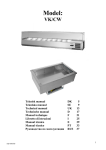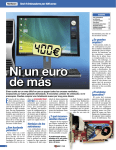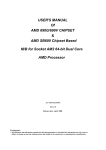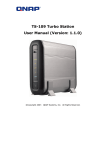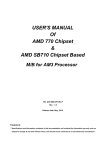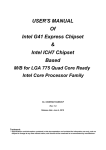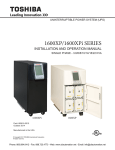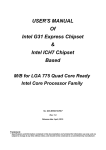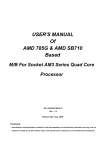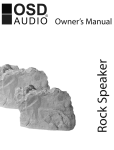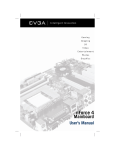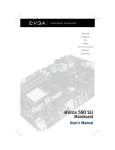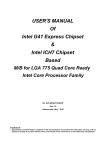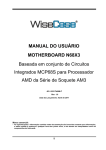Download Electronic Emission Notices
Transcript
Electronic Emission Notices Federal Communications Commission (FCC) Statement This equipment has been tested and found to comply with the limits for a Class B digital device, pursuant to Part 15 of FCC Rules. These limits are designed to provide reasonable protection against harmful interference in a residential installation. This equipment generates, uses and can radiate radio frequency energy and, if not installed and used in accordance with instructions contained in this manual, may cause harmful interference to radio and television communications. However, there is no guarantee that interference will not occur in a particular installation. If this equipment does cause harmful interference to radio or television reception, which can be determined by turning the equipment off and on, the user is encouraged to try to correct the interference by one or more of the following measures: - REORIENT OR RELOCATE THE RECEIVING ANTENNA - INCREASE THE SEPARATION BETWEEN THE EQUIPMENT AND THE RECEIVER - CONNECT THE EQUIPMENT INTO AN OUTLET ON A CIRCUIT DIFFERENT FROM THAT OF THE RECEIVER - CONSULT THE DEALER OR AN EXPERIENCED AUDIO/TELEVISION TECHNICIAN NOTE: Connecting this device to peripheral devices that do not comply with Class B requirements, or using an unshielded peripheral data cable, could also result in harmful interference to radio or television reception. The user is cautioned that any changes or modifications not expressly approved by the party responsible for compliance could void the user’s authority to operate this equipment. To ensure that the use of this product does not contribute to interference, it is necessary to use shielded I/O cables. Copyright This manual is copyrighted with all rights reserved. No portion of this manual may be copied or reproduced by any means. While every precaution has been taken in the preparation of this manual, no responsibility for errors or omissions is assumed. Neither is any liability assumed for damages resulting from the use of the information contained herein. Trademarks All brand names, logos and registered trademarks mentioned are property of their respective owners. ii TABLE OF CONTENT INTRODUCTION FEATURES OF MOTHERBOARD .................................................................................... 1 SPECIAL DESIGN OF MOTHERBOARD ........................................................................ 2 SPECIFICATION................................................................................................................... 3 MOTHERBOARD LAYOUT ............................................................................................... 4 HARDWARE INSTALLATION INSTALL SOCKET AM2 SUPPORTED AMD PROCESSOR ........................................ 5 INSTALL MEMORY ............................................................................................................ 5 EXPANSION CARDS............................................................................................................ 7 CONNCTORS, HEADERS & JUMPERS SETTING CONNECTORS...................................................................................................................... 8 HEADERS .............................................................................................................................. 11 BIOS & SETUP BIOS Setup Utility.................................................................................................................. 13 Setup SATA RAID ............................................................................................................... 14 BIOS/FLASH Update Procedure.......................................................................................... 20 TROUBLE SHOOTING ...................................................................................................... 20 The Introduction of BIOS BACK Function......................................................................... 21 HDMI Audio Setup ................................................................................................................ 21 Box Included Checklist 5 5 5 5 5 5 Sapphire PE-AM2RS690MH Motherboard Cable for ATA 133 IDE Sapphire Driver CD for Motherboard Cable for Serial ATA II Rear External I/O Shield Sapphire PE-AM2RS690MH Motherboard User’s Manual Environmental Protection Announcement Do not dispose this electronic device into the trash while discarding. To minimize pollution and ensure environment protection of mother earth, please recycle. 1 Features of Motherboard The AMD 690G Series motherboards are based on the latest AMD 690G Chipset and SB600 chipset which supports the new generation innovative 64-bit AMD Socket AM2 dual core multi-tasking Socket AM2 Athlon64 X2 processors. With an integrated low-latency high-bandwidth DDR2 memory controller and the highly-scalable Hyper Transport technology-based system bus which is up to 1000 MHZ, AMD 690G/690V Platform Processor Chipset motherboard series deliver the outstanding system performance and professional desktop platform solution with the advantages of new generation 64-bit AMD Socket AM2 Athlon64 X2 processors and the fully compatibility of the next generation operation system. The AMD 690G Series motherboards support new generation Socket AM2 processors with an integrated DDR2 memory controller which provides with 266MHz / 333MHz/ 400MHz memory clock frequency for Dual channel DDR2 533 / DDR2 667 / DDR2 800 (Sempron processor of AM2 socket only supports up DDR2 667) DDR2 Module up to 8.0GB. The whole motherboard series are embedded with SB600 chipset that provides ULTRA ATA 133 connectors and Serial ATA2 with RAID 0, 1, and RAID 10 functions which support up to two IDE devices and four Serial ATA2 devices to accelerate hard disk drives and guarantee the data security without failure in advanced computing performance. The AMD 690G Series motherboards integrated ATI Radeon X1250 Graphics support ATI innovated AVIVO Technology and Multiple Display configurations: CRT+ DVI-D or HDMI on rear panel and give you the best performance in game experience. AMD™ 690G/690V chipset provides incredible flexibility and unlimited upgrade potential as it supports all Radeon® PCI – E graphics cards on a system configured for either single GPU or next generation multimedia operation. Designed with ATI’s unique architecture to optimize speed and stability, this solution is perfect for overclocking – without the need of additional cooling systems. The 690G series motherboards provide 10/100/1000 LAN functions with Realtek RTL8111B-GR PCI-E Gigabit LAN which supports 10/100/1000 Mbps data transfer rate. And the embedded Azalia 8-channel Audio CODEC is fully compatible with Sound Blaster Pro® standards that offer you with the home cinema quality and satisfying software compatibility. The motherboards offer one PCI-Express x16 graphics slot of 4Gbyte/sec data transfer rate at each relative direction which gets 3.5 times of bandwidth more than AGP 8X and it’s up to a peak concurrent bandwidth of 8Gbyte/sec at full speed to guarantee the ultimate GPU computing performance. Two32-bit PCI slots guarantee the rich connectivity for the I/O of peripherals; the motherboards are designed of tackling the profuse multimedia requirements nowadays. Embedded USB controller as well as capability of expanding to 8 of USB2.0 functional ports delivering 480Mb/s bandwidth and rich connectivity, these motherboards meet the future USB demands which are also equipped with hardware monitor function on system to monitor and protect your system and maintain your non-stop business computing. SAPPHIRE PURE ELEMENT HDMI 2 Special Design of Motherboard Debug Port --- ( The Professional Hardware Diagnosis System ) Being bugged of abnormal system failure through the tossed and turned nights no more, the embedded Hardware Debug Port offers you the real-time visual system healthy for the demanding usage of computing. No more bugging by unknown system failure and no more time wasted in the first moment of 24-hour nonstop ping business computing, the embedded Debug Port will turn you into a well training hardware professional with the seeing system situation. (The Post Code please refer to the Website) CPU Smart Fan---( The Noise Management System(Only support 4-pin CPU cooler) ) It’s never been a good idea to gain the performance of your system by sacrificing its acoustics. CPU Smart Fan Noise Management System is the answer to control the noise level needed for now-a-day’s high performance computing system. The system will automatically increase the fan speed when CPU operating loading is high, after the CPU is in normal operating condition, the system will low down the fan speed for the silent operating environment. The system can provide the much longer life cycle for both CPU and the system fans for game use and business requirements. CPU Vcore 7-Shift--- (Shift to Higher Performance) The CPU voltage can be adjusted up by 7 steps for the precisely over-clocking of extra demanding computing performance. BIOS BACK Function --- ( The BIOS Backup and Recovery Function ) With the new support for the Serial Peripheral Interface, the whole motherboard series are embedded with the new storage of the extra bin file for BIOS recovery. When unexpected error occurs, even the BIOS crashes down, you can restore your BIOS with just simply clicking to restart your system. The backup bin file will recover original BIOS within a few minutes. CPU Thermal Throttling Technology---(The CPU Overheat Protection Technology) To prevent the increasing heat from damage of CPU or accidental shutdown while at high workload, the CPU Thermal Throttling Technology will force CPU to enter partially idle mode from 87.5% to 12.5% according to preset CPU operating temperature in BIOS (from 40 ℃ to 90℃). When the system senses the CPU operating temperature reaching the preset value, the CPU operating bandwidth will be decreased to the preset idle percentage to cool down the processor. When at throttling mode the beeper sound can be optionally selected to indicate it is in working. Above Sapphire Feature Functions in this motherboard are designed for power user to use the over-clocking function in more flexible ways. But please be caution that the over-clocking maybe cause the fails in system reliabilities. This motherboard provides the guaranteed performance and meets the demands of the next generation computing. But if you insist to gain more system performance with variety possibilities of the components you choose, please be careful and make sure to read the detailed descriptions of these value added product features, please get them in the coming section. SAPPHIRE PURE ELEMENT HDMI 3 Specification Spec Design Chipset CPU Socket AM2 Memory Socket Expansion Slot Integrate IDE and Serial ATA2 RAID Description ∗ Micro ATX form factor 4 layers PCB size: 24.4 cm*21.0cm ∗ AMD 690G/690V Chipset and AMD SB600 Chipset ∗ Support 64bit AMD AM2 940-Pin package utilizes Flip-Chip Pin Grid Array package compatible processor ∗ Support for HTT 1GHz AMD Athlon 64 X2 processor and Athlon 64, and HTT 800MHz Sempron Processors ∗ 240-pin DDR2 Module socket x 4 ∗ Support 4 pcs DDR2 533 / DDR2 667 / DDR2 800 Modules Expandable to 8.0 GB ∗ PCI-Express x16 slot 1pcs delivers up to 8 GB/s of concurrent bandwidth. ∗ 32-bit PCI slot x 2 pcs ∗ One IDE controllers support PCI Bus Mastering, ATA PIO / DMA ∗ Integrated VGA ∗ ∗ ∗ ∗ LAN (Option) ∗ ∗ LAN(Option) ∗ ∗ HD 8-CH Audio ∗ BIOS Multi I/O ∗ ∗ ∗ ∗ ∗ ∗ ∗ ∗ ∗ ∗ ∗ ∗ and the ULTRA DMA 33/66/100/133 functions that deliver the data transfer rate up to 133 MB/s. Four Serial ATA2 ports provide 300 MB/sec data transfer rate with RAID 0, 1, 10 functions. Integrated with ATI Radeon X1200 / X1250 Graphic a core frequency of 400 MHz and 2 shader pipeline DirectX 9.0 compliant 2D/3D graphics processor supported ATI innovated AVIVO Technology and Multiple Display configurations (only for 690G series) Integrated Realtek RTL8111B-GR PCI-E gigabit LAN chip Supports Fast Ethernet LAN function provide 10/100/1000 Mb /s data transfer rate Integrated Realtek RTL8101E-GR PCI-E10/100 LAN chip Supports Fast Ethernet LAN function provide 10/100Mb /s data transfer rate Realtek ALC880E Azalia HD 8-channel Audio Codec integrated Support 8-channel 3D surround & Positioning Audio Audio driver and utility included Award 4MB Flash ROM PS/2 keyboard and PS/2 mouse connectors Floppy disk drive connector x1 1* Parallel port of 25-pin Block 1 * Serial port of 9-pin Block 1 * VGA port / 1 * TV-OUT header 1 * HDMI port(optional) 1 * DVI port(optional) USB2.0 port x 4 and headers x 4 (connecting optional cable) Audio connector (Line-in, Line-out, MIC/ 8CH Audio) SAPPHIRE PURE ELEMENT HDMI 4 Motherboard Layout Keyboard/USB Power (JP1) CPU Socket AM2 CPU FAN BIOS BACK Chip PS2 KB/Mouse Port I/O Controller Chip Optional VGA DDR2 Socket x 4 ATX Power Conn. Parallel Connector Optional DVI USB Port ATX 12V Power Connector RJ45 Over USB Connector ATA 133 IDE Conn.(IDE1) Floppy Connector Audio Connector AMD 690G/690V Chipset SFAN1 4MBit Flash ROM BIOS Clear CMOS (JBAT) Debug Port TV-OUT PCI Express x16 Optional Realtek RTL8111B Gigabit LAN Serial-ATAII Connector (SATA II 1, 2,3,4) Realtek ALC880 Audio Decode PCI Slot Front Panel Connector Power LED Connector Speaker Connector Audio USB Port CDIN COM1 SFAN2 (USB3, USB4) USB Power On Jumper (JP2) AMD SB600 SAPPHIRE PURE ELEMENT HDMI 5 Hardware Installation Install Socket AM2 Supported AMD Processor This motherboard provides a 940-pin surface mount, Zero Insertion Force (ZIF) socket, referred to as the mPGA940 socket supports AMD Athlon64 processor in the 940 Pin package utilizes Flip-Chip Pin Grid Array package technology. The CPU that comes with the motherboard should have a cooling FAN attached to prevent overheating. If this is not the case, then purchase a correct cooling FAN before you turn on your system. WARNING! Be sure that there is sufficient air circulation across the processor’s heatsink and CPU cooling FAN is working correctly, otherwise it may cause the processor and motherboard overheat and damage, you may install an auxiliary cooling FAN, if necessary. To install a CPU, first turn off your system and remove its cover. Locate the ZIF socket and open it by first pulling the level sideways away from the socket then upward to a 90-degree angle. Insert the CPU with the correct orientation as shown below. The notched corner should point toward the end of the level. Because the CPU has a corner pin for two of the four corners, the CPU will only fit in the orientation as shown. Socket AM2 Colden Arrow CPU ZIF mPGAB Socket When you put the CPU into the ZIF socket, No force require to insert of the CPU, then press the level to Locate position slightly without any extra force. Install Memory This motherboard provides four 240-pin DDR2 DUAL INLINE MEMORY MODULES (DIMM) socket for DDR2 memory expansion available from minimum memory volume of 128MB to maximum memory volume of 8.0GB DDR SDRAM. Valid Memory Configurations Bank 240-Pin DIMM PCS Total Memory Bank 0, 1 (DIMM1) Bank 2, 3 (DIMM2) Bank 4, 5 (DIMM3) Bank 6,7 (DIMM4) Total DDR2 533/DDR2 667/DDR2 800 DDR2 533/DDR2 667/DDR2 800 DDR2 533/DDR2 667/DDR2 800 DDR2 533/DDR2 667/DDR2 800 System Memory (Max. 8.0GB) X1 X1 X1 X1 4 128MB∼2.0GB 128MB∼2.0GB 128MB∼2.0GB 128MB∼2.0GB 128MB∼8.0GB SAPPHIRE PURE ELEMENT HDMI 6 Recommend DIMM Module Combination 1. 2. 3. One DIMM Module ----Plug in DIMM1 Two DIMM Modules---Plug in DIMM1 and DIMM2 for Dual channel function Four DIMM Modules---Plug in DIMM1/DIMM2/DIMM3/DIMM4. For Dual channel Limited! 4. 5. Dual channel function only supports when 2 DIMM Modules plug in either both DIMM1 & DIMM2 or DIMM3 &DIMM4, or four DIMM Modules plug in DIMM1~DIMM4. DIMM1 & DIMM2 or DIMM3 & DIMM4 must be the same type, same size, same frequency for dual channel function. Install DDR SDRAM modules to your motherboard is not difficult, you can refer to figure below to see how to install a 240-Pin DDR2 533/DDR2 667/DDR2 800 SDRAM module. NOTE! When you install DIMM module fully into the DIMM socket the eject tab should be locked into the DIMM module very firmly and fit into its indention on both sides. WARNING! For the DDR SDRAM CLOCK is set at 400MHz, use only DDR2 800- compliant DDR2 Modules. When this motherboard operate at 400Mhz, most system will not even boot if non-compliant modules are used because of the strict timing issues, if your DDR Modules are not DDR2 800-compliant, set the SDRAM clock to 200MHz to ensure system stability. SAPPHIRE PURE ELEMENT HDMI 7 Expansion Cards The motherboards offer one PCI-Express x16 graphics slot of 4Gbyte/sec data transfer rate at each relative direction which gets 3.5 times of bandwidth more than AGP 8X and it’s up to a peak concurrent bandwidth of 8Gbyte/sec at full speed to guarantee the ultimate GPU computing performance. Two32-bit PCI slots guarantee the rich connectivity for the I/O of peripherals; the motherboards are designed of tackling the profuse multimedia requirements nowadays. PE1 / PCI-E x16 Slot 32-bit PCI Slot SAPPHIRE PURE ELEMENT HDMI 8 Connectors, Headers & Jumpers Setting Connectors (1) Power Connector (24-pinblock) : ROW1 ROW2 PIN ROW1 ROW2 ROW1 ROW2 ATXPWR1 1 3.3V 3.3V ATX Power Supply connector: 2 3.3V -12V 3 GND GND This is a new defined 24-pins 4 5V Soft Power On connector that usually comes with 5 GND GND 6 5V GND ATX case. The ATX Power Supply 7 GND GND 8 Power OK -5V allows using soft power on 9 +5V (for Soft Logic) +5V momentary switch that connect from 10 +12V +5V 11 +12V +5V the front panel switch to 2-pins 12 +3V GND Power On jumper pole on the motherboard. When the power Pin 1 Pin 1 switch on the back of the ATX 24-Pin 20-Pin power supply turned on, the full power will not come into the system board until the front panel switch is momentarily pressed. Press this switch again will turn off the power to the system board. ** We recommend that you use an ATX 12V Specification 2.0-compliant power supply unit (PSU) with a minimum of 350W power rating. This type has 24-pin and 4-pin power plugs. ** If you intend to use a PSU with 20-pin and 4-pin power plugs, make sure that the 20-pin power plug can provide at least 15A on +12V and the power supply unit has a minimum power rating of 350W. The system may become unstable or may not boot up if the power is inadequate. (2) ATX 12V Power Connector (8-pin block) : ATX12V1 This is a new defined 8-pins connector that usually comes with ATX Power Supply. The ATX Power Supply which fully supports AM2 processor must including this connector for support extra 12V voltage to maintain system power consumption. Without this connector might cause system unstable because the power supply can not provide sufficient current for system. (3) PS/2 Mouse & PS/2 Keyboard Connector: KB1 The connectors are for PS/2 keyboard and PS/2 Mouse. (3) USB Port connector: CN3 The connectors are 4-pin connectors that connect USB devices to the system board. (5) LAN Port connector: UL1 This connector is standard RJ45 connector for Network The USBLAN1 support optional 10M/100M or 10M/100Mb/1000Mb s data transfer rate SAPPHIRE PURE ELEMENT HDMI 9 (6) Audio Line-In, Lin-Out, MIC, Surrback, Surround, CEN/LEF Connector: SURROUND1 / CN1 This Connector are 6 phone Jack for LINE-OUT, LINE-IN, MIC, Surrback, Surround, CEN/LEF Audio input to sound chip Line-in : (BLUE) Audio output to speaker Line-out : (GREEN) Microphone Connector MIC : (PINK) Audio output to speaker-Rear speaker out Surrback : (ORANGE) CEN/LEF : (BLACKNESS) Audio output to speaker-Center/Subwoofer speaker out Audio output to speaker-Side speaker out Surround: (GRAY) PS/2 Mouse Gigabit LAN HDMI PS/2 Keyboard VGA Line-IN Surrback Line-OUT CEN/LFE Surround MIC-IN USB1 USB2 SAPPHIRE PURE ELEMENT HDMI 10 (7) Floppy drive Connector (34-pin block): FDD1 This connector supports the provided floppy drive ribbon cable. After connecting the single plug end to motherboard, connect the two plugs at other end to the floppy drives. FDD Pin 1 (8) Primary IDE Connector (40-pin block): IDE1 Floppy Drive Connector This connector connects to the next set of Master and Slave IDE1 hard disks. Follow the same procedure described for the primary IDE connector. You may also configure two hard disks to be both Masters using one ribbon cable on the primary IDE connector and another ribbon cable on the secondary IDE connector. Pin 1 • Two hard disks can be connected to each connector. The first Primary IDE Connector HDD is referred to as the “Master” and the second HDD is referred to as the “Slave”. • For performance issues, we strongly suggest you don’t install a CD-ROM or DVD-ROM drive on the same IDE channel as a hard disk. Otherwise, the system performance on this channel may drop. SATA4 (9) Serial-ATA Port connector: SATA1 / SATA2 / SATA3/ SATA4 These connectors support the provided Serial ATA and Serial ATA2 IDE hard disk cable to connecting the motherboard and serial ATA hard disk. SATA3 SATA2 SATA1 Serial-ATA1 & 2 Compatible Connectors (10) D-Sub 15-pin Connector: VGA VGA is the 15-pin D-Subminiature female connector; it is for the display devices, such as the CRT monitor, LCD monitor and so on. (11) DVI: Digital Visual Interface (Optional) This interface standard designed to maximize the visual quality of digital display devices such as flat panel LCD computer displays and digital projectors. (12) HDMI: High-Definition Multimedia Interface (Optional) This point-to-point interface is for audio and video signals designed as a single-cable solution for home theater and consumer electronics equipment. SAPPHIRE PURE ELEMENT HDMI 11 (1) Line-Out/MIC Header for Front Panel (9-pin): AUDIO1 These headers connect to Front Panel Line-out, MIC connector with cable. Without install the cable, this header default setting is 5-6 short, 9-10 short. When you install the cable you have take off these jumpers. AUDIO AUD_RET_L AUD_GND AUD_VCC AUD_RET_R Headers 2 10 Pin 1 AUD_MIC AUD_MIC_BIAS AUD_FPOUT_R HP_ON AUD_FPOUT_L 9 +DATA GND OC VCC -DATA VCC -DATA +DATA GND OC -DATA USB4 +DATA GND +DATA GND Pin 1 Pin 1 VCC USB3 / USB4 These headers are used for connecting the additional USB port plug. By attaching an option USB cable, your can be provided with two additional USB plugs affixed to the back panel. USB3 -DATA (2) USB Port Headers (9-pin) : VCC Line-Out, MIC Headers USB Port Headers (3) Speaker connector: SPEAK1 This 4-pin connector connects to the case-mounted speaker. See the figure below. (4) Power LED: PWR LED1 The Power LED is light on while the system power is on. Connect the Power LED from the system case to this pin. JW FP GND PWRBTN SPEAK VCC5 HDDLE GND RSTSW NC HDLED RESET GND Pin 1 VCC5 Pin 1 SPKR NC (6) Reset switch lead: RESET This 2-pin connector connects to the case-mounted reset switch for rebooting your computer without having to turn off your power switch. This is a preferred method of rebooting in order to prolong the lift of the system’s power supply. See the figure below. PWRBTN PWRLED Pin 1 PWRLED VCC5 PWR LED (5) IDE Activity LED: HD LED This connector connects to the hard disk activity indicator light on the case. System Case Connections (7) Power switch: PWR BTN This 2-pin connector connects to the case-mounted power switch to power ON/OFF the system. SAPPHIRE PURE ELEMENT HDMI 12 CPUFAN OUT CPUFAN IN GND +12V (8) FAN Power Headers: SYSFAN1, SYSFAN2 (3-pin), CPUFAN (4-pin) These connectors support cooling fans of 350mA (4.2 Watts) or less, depending on the fan manufacturer, the wire and plug may be different. The red wire should be positive, while the black should be ground. Connect the fan’s plug to the board taking into consideration the polarity of connector. CPUFAN 4 1 SYSFAN2 SYSFAN1 3 1 3 1 FAN Power Headers (9) CD Audio-In Headers (4-pin) : CDIN CDIN are the connectors for CD-Audio Input signal. connect it to CD-ROM CD-Audio output connector. Please CDIN 4 1 CD Audio-In Headers (10) Parallel Port Header (25-pin male): PARALLEL1 The On-board Parallel Port can be disabled through the BIOS SETUP. Pin 1 PARALLEL (11) Serial COM Port Header: COM1 COM1 is the 9-pin block pin-header. The On-board serial port can be disabled through BIOS SETUP. Pin1 Serial COM Port 9-pin Block (12) TV-OUT Header TV-OUT is the 9-pin block pin-header..TV-out is commonly used to label the connector of equipment offering an analog video signal that is acceptable for a television AV input. Pin1 TV-OUT Conn. 9-pin Block SAPPHIRE PURE ELEMENT HDMI 13 BIOS & SETUP BIOS Setup Utility About the Phoenix-Award BIOS Setup Utility The motherboard uses the latest Award BIOS with support for Windows Plug and Play. The CMOS chip on the motherboard contains the ROM setup instructions for configuring the motherboard BIOS. The BIOS ( Basin Input and Output System ) Setup Utility displays the system’s configuration status and provides you with options to set system parameters. The parameters are stored in battery-backed-up CMOS RAM that saves this information when the power is turned off. When the system is turned back on, the system is configured with the values you stored in CMOS. The BIOS Setup Utility enables you to configure: Hard drives, diskette drivers and peripherals Video display type and display options Password protection to prevent unauthorized use Power Management features The settings made in the Setup Utility affect how the computer performs. Before using the Setup utility, ensure that you understand the Setup Utility options. The Standard Configuration A standard configuration has already been set in the Setup Utility. However, we recommend that you understand to make any changes in the feature. This Setup Utility should be used: - when changing the system configuration when a configuration error is detected and you are prompted to make changes to the Setup Utility when trying to resolve IRQ conflicts when making changes to the Power Management configuration when changing the password or making other changes to the Security Setup Entering the Setup Utility When you power on the system, BIOS enters the Power-On Self Test (POST) routines. SAPPHIRE PURE ELEMENT HDMI 14 POST is a series of build-in diagnostics performed by the BIOS. After the POST routines are completed, the following message appears: Main Menu Once you enter the Award BIOS CMOS Setup Utility, the Main Menu will appear one the screen. The Main Menu allows you to select from various setup functions and two exit choices. Use the arrow keys to select among the items and press <Enter> to accept and enter the sub-menu. Phoenix – AwardBIOS CMOS Setup Utility f Standard CMOS Features f Advanced BIOS Features f Advanced Chipset Fetures f Integrated Peripherals f Power Management Setup f PnP / PCI Configurations f PC Health Status ESC : Quit F10 : Save & Exit Setup f Power User Overclocking Settings f CPU Thermal Throtting Setup f Password Settings Load Failed-Safe Default Load Optimized Default Save & Exit Setup Exit without Saving yzxw : Select Item Time, Date, Hard Disk Type …… ( Note: The sample BIOS Setup Menu included here only shows a typical case, and may not be exactly the same as the one on your unit. ) Note that a brief description of each highlighted item will appear at the bottom of the screen. Setup SATA RAID Press the delete key accessed the BIOS Setup Utility. When you have entered, the Main Menu appears on the screen. Use the arrow keys to select the item “ Integrated Peripherals” and press the <Enter> key to accept. Use the arrow keys to select the item “South OnChip IDE Device” and press the <Enter> key to accept. After that, use the arrow keys to set the item “ ATI SATA Type” to “RAID” Creat a Bootable Logical Drive Description Create a Logical Drive Description A logical drive appears to the computer as a single hard disk drive. As a result, you can install your operating system onto a logical drive and boot your computer from the logical drive. The following steps describe how to create a bootable logical drive. Create a Logical Drive SAPPHIRE PURE ELEMENT HDMI 15 You will now use the onboard FastBuild BIOS utility ot create a logical drive. 1. Boot your system. If this is the first time you have booted with the disk drives installed, the ATI onboard BIOS will display the following screen ( below). RAID AHCI ™ BIOS Version 2.5.1540.18 © 2004-2005 ATI Technology , Inc. All rights reserved. No Array is defined… Press <Ctrl-F> to enter FastBuild ™ Utility… 2. Press the Ctrl-F keys to display the FastBuild Utility Main Menu (below). FastBuild ™ Utility © 2004-2005 ATI Technology, Inc. Main Menu Viov Drive Assignments.…..[1] Define LD…….…..………..[2] Delete LD…………………..[3] Controller Configuration…...[4] Keys Available Press 1...4 to select option [Esc]….Exit 3. Press 2 on the Main Menu screen to display the Define LD Menu (below). FastBuild ™ Utility © 2004-2005 ATI Technology, Inc. Define LD Menu LD No LD 1 LD 2 LD 3 LD 4 LD 5 LD 6 LD 7 LD 8 RAID Mode ------------------------- Total Drv ------------------------- Capacity (MB) ------------------------- Status ------------------------- SAPPHIRE PURE ELEMENT HDMI 16 [Ç] UP Keys Available [È] Down [Esc] Exit [Enter] Select 4. Press the arrow keys to highlight an logical drive number you want to defines and press Enter to select it. The Define LD Menu for the logical drive number you selected will next appear (below). FastBuild ™ Utility © 2004-2005 ATI Technology, Inc. LD No LD 1 Define LD Menu RAID Mode RAID 1 Stripe Block: NA Gigabyte Boundary: ON Drive Assignments Channel ID Drive Model 1: Mas ST380013AS 2: Mas ST380013AS 3: Mas ST380013AS 4: Mas ST380013AS [Ç] UP [È] Down Total Drv 2 Fast Init: OFF Cache Mode: Write Back Capacity (MB) 80027 80027 80027 80027 Assignment Y Y N N Keys Available [Esc] Exit [Space] Change Option [Ctrl-Y] Save 5. Choose the RAID Level you want. In the Define LD Menu section, press the Space bar to cycle through logical drive types: y RAID 0 (Stripe) y RAID 1 ( Mirror) y RAID 10 ( Stripe / Mirror ) NOTE: While you can use any available RAID Level for your bootable logical drive, ATI recommends RAID 1 for most applications. 6. Press the arrow keys to move to the next option. Option choices depend on th RAID Level you selected. y Initialize logical drive , zero the disk drives. RADI 1 or 10 only SAPPHIRE PURE ELEMENT HDMI 17 y Stripe Block Size, the default 64KB is best for most applications. RAID 0 or 10 only. y Gigabyte Boundary, allows use of slightly smaller replacement drives. y Cache Mode, WriteThru or WriteBack. 7. Press the arrow keys to move to Disk Assignments. Press the space bar to toggle between N and Y for each available drive. Y means this disk drive will be assigned to the logical drive. Assign the appropriate number of disk drives to your logical drive. 8. Press Ctrl-Y to save your logical drive configuration. You have the option of using all of the disk drive capacity for one logical drive or allocating a portion to a second logical drive. Press Ctrl-Y to modify Array Capacity or press any other Key to use Maximum Capacity … Choose one of the following actions: y Use the full capacity of the disk drives for a single logical drive. Go to “One Logical Drive” below. y Split the disk drives among two logical drives. Go to “Two Logical Drives” below. One Logical Drive Continued from Create a Logical Drive step 8, above. 1. Press any key ( except for Ctrl-Y ) to use the full portion of the logical drive for one logical drive. 2. Press Esc to exit to the Main Menu. Press Esc again to exit the Utility. 3. Press Y to restart the computer. You have successfully created a new RAID logical drive. Two Logical Drives Continued from Create Logical Drive Step 8, above. 1. Press Ctrl-Y to allocate a portion of the disk drives to the first logical drives. FastBuild ™ Utility © 2004-2005 ATI Technology, Inc. SAPPHIRE PURE ELEMENT HDMI 18 Define LD Menu LD No RAID Mode LD 1 RAID 1 Stripe Block: NA Gigabyte Boundary: ON Total Drv 2 Fast Init: OFF Cache Mode: Write Back Drive Assignments Channel ID Drive Model Capacity (MB) Assignment 1: Mas ST380013AS 80027 Y 2: Mas ST380013AS 80027 Y Enter array capacity (in MB) here: 100000 3: Mas ST380013AS 80027 N 4: Mas ST380013AS 80027 N [Ç] UP Keys Available [Esc] Exit [Space] Change Option [È] Down [Ctrl-Y] Save 2. Enter the desired capacity in MB for the first logical drive and press Enter. The Define LD Menu displays again. FastBuild ™ Utility © 2004-2005 ATI Technology, Inc. Define LD Menu LD No LD 1 LD 2 LD 3 LD 4 LD 5 LD 6 LD 7 LD 8 RAID Mode RAID 1 ---------------------- [Ç] UP Total Drv 2 ---------------------- Capacity (MB) 10000 ---------------------- Keys Available [È] Down [Esc] Exit Status Functional ---------------------- [Enter] Select 3. Press the up and down arrow keys to select an available logical drive number and press Enter. FastBuild ™ Utility © 2004-2005 ATI Technology, Inc. SAPPHIRE PURE ELEMENT HDMI 19 LD No LD 1 Define LD Menu RAID Mode RAID 1 Stripe Block: NA Gigabyte Boundary: ON Drive Assignments Channel ID Drive Model 1: Mas ST380013AS 2: Mas ST380013AS 3: Mas ST380013AS 4: Mas ST380013AS [Ç] UP [È] Down Total Drv 2 Fast Init: OFF Cache Mode: Write Back Capacity (MB) 39960 39960 80027 80027 Assignment Y Y N N Keys Available [Esc] Exit [Space] Change Option [Ctrl-Y] Save 4. Choose the RAID level and options for the second logical drive. Note that the disk drives in Channels 1 and 2 reflect smaller capacities because a portion of their capacity belongs the first logical drive. In this example the disk drives in Channels 3 and 4 are not assigned to a logical drive. 5. Press Ctrl-Y to save your logical drive configuration. 6. Press Ecs to exit to the Main Menu. Press Esc again to exit the Utility. 7. Press Y to restart the computer. You have successfully created a new RAID logical drive. SAPPHIRE PURE ELEMENT HDMI 20 BIOS/FLASH Update Procedure Before updating the BIOS, users have to “Disable” the “Flash Part Write Protect” selection in “PnP / PCI Configurations” of BIOS SETUP. Otherwise the system the will not allow you to upgrade BIOS by Award Flash Utility. STEP 1. Prepare a DOS bootable diskette. (you may make one by click START click RUN type SYS A:click OK) STEP 2. Copy utility program to your DOS bootable diskette. You may copy from DRIVER CD X:\FLASH\AWDFLASH.EXE or download from our web site. STEP 3. Download and make a copy of the latest BIOS from the web site to your DOS bootable diskette. STEP 4. Insert your DOS boot diskette into A:, start the computer, type “Awdflash A:\ XXXX.BIN /SN/PY/CC/R” XXXX .BIN is the file name of latest BIOS SN means don’t save existing BIOS data PY means renew existing BIOS data CC means clear existing CMOS data R means restart computer You can type “Awdflash /? To list all switch and command definitions. STEP 5. Push ENTER to update and flash the BIOS, then the system will restart automatically. Trouble Shooting Problem Solution No power to the system to the all power light don’t illuminate, fan inside power supply doesn’t turn on. System inoperative. Keyboard lights are on , power indicator lights are lit, and hard drive is spinning. System doesn’t boot from hard disk drive, can be booted from optical drive. 1. Make sure power cable is security plugged in. 2. Replace cable. 3. Contact technical support. System only boots from optical drive .Hard disk can be read and applications can be used but booting from hard disk is impossible. Screen message says “Invalid Configuration” or “CMOS Failure” Can not boot system after installing second hard drive. 1. Back up date and applications files. 2. Reformat the hard drive. Reinstall applications and date using backup disks. Review system ‘s equipment .Make sure correct information on is in setup. 1. Set master /slave jumpers correctly. 2. Run SETUP program and select correct drive types. Call the drive manufacture for compatibility with other drives. Using ever pressure on both ends of the DIMM , press down firmly until the module snaps into places. 1. Check cable running from disk to disk controller board. .Make sure both ends are securely plugged in, check the drive type in the standard CMOS setup. 2. Backing up the hard drive is extremely important .All hard disks are capable of breaking down at any time. SAPPHIRE PURE ELEMENT HDMI 21 The Introduction of BIOS BACK Function Advanced BIOS Back & Recovery Function “BIOS Back” function is automatically activated when the original BIOS malfunction occurs. When it occurs to BIOS malfunction, the BIOS BACK function will be activated automatically, then the system will restart to reload the BIOS backup to the system boot up menu as the following figure. It takes 4 to 8 seconds to get into the boot up menu and here comes the message, “Warning! Now System is BACKUP BIOS. Please reflash primary BIOS.” after system reboots. And then, please follow the OSD to press “F1” button to continue to log on your operation system. Phoenix – Award WorkstationBIOS V6.00PG Copyright © 1984-2006, Phoenix Technology, LTD (m2a481t0b) EVALUATION ROM – NOT FOR SALE Main Processor : AMD Athlon™ 64 X2 Dual Core Processor 4600+ (200 X 12 = 2400MHz) Memory Testing : 458752 OK+ 64M shared memory Memory Speed is : DDR2 533 , Dual Channel , 128-bit IDE Channel 0 Master : None IDE Channel 0 Slave : None SATA Channel 1 : ASUS CRW-5232°1-T 1.00 SATA SATA Channel 2 : Hitachi HDT725050VLA360 V560A52A SATA2 Warning Now System is BACKUP BIOS. Please reflash primary BIOS. CPU Temp: System1 Temp: 26℃ / 78℉ 26℃ / 78℉ CPUFAN SPEED: 3512 RPM SFAN1 SPEED: 0 RPM SFAN2 SPEED: 0 RPM Vcore : 1.24V Vcore : 1.24V +5V : 5.02V VDIMM: 1.84V +12V: 11.98V VBAT: 3.12V Press F1 to Continue, DEL to enter SETUP 01/20/2006-RS690-SB600-6A666J1HC-00 Please make sure to Update the BIOS after getting into operation system, or the BIOS BACK function will check your primary BIOS status every time, and it may cause your inconvenience too. HDMI Audio SETUP 1. BIOS Setup Make sure “HDMI Azalia” to [ENABLE] in the “ Advanced Chipset Features”. Then save the setup and exit. 2. Driver Installation After Windows XP2 has finished booting up, insert the bundled CD into your CD-ROM drive and select “PATCH” to install KB888111.exe in the path \ATIRS690\HDMI\. ( see below picture ) The installation bar on the dialogue windows to begin the software installation. And when the system prompt Sear for the best driver in those location window, select include this location in the search, then select the path \ATIRS690\HDMI to begin software installation. ( please follow the instruction to finish the installation. ) SAPPHIRE PURE ELEMENT HDMI 22 After installed HDMI Azalia device, please select the default Audio device in the control panel. Then, can has HDMI audio output from your HDMI TV or Monitor. ( see below) Windows XP Windows Vista SAPPHIRE PURE ELEMENT HDMI 23 Note to User: Some HDTV or HDMI monitor may has problem in HDMI sound caused by HDMI cable or adapter. Some HDTV or HDMI supported monitor need adjust resolution to fit correct and perfect digital Video and Audio output. User can use ATI Catalyst Control Center to add supported format of display. SAPPHIRE PURE ELEMENT HDMI


























